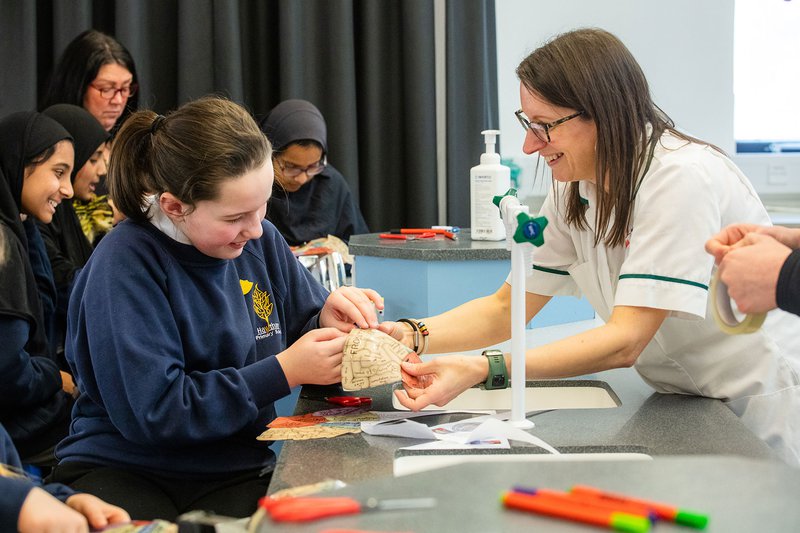Nurturing new friendships
The team at Life Science Centre, part of the International Centre for Life, are experts in the delivery of a variety of community engagement programmes working with groups of people who are less likely than others to visit the centre due to sensory, cultural, or financial barriers.
Supporting equitable access
The team at Life Science Centre opted to use their STFC funding to support multiple strands of their community programme, running several different events to provide opportunities to young people and families who might otherwise struggle to access such days out. A ‘STEMtastic’ day gave over 350 pupils from a local school trust a fun-filled day of workshops and interactions with STEM experts and professionals. Families from some of the lowest income areas of Newcastle attended the expert ‘takeover’ days, during specially adapted ‘quiet days’, and by using free passes distributed via a partnership with community partner Children North East.
Autistic young people from North East Autism Society attended the Science Club over three months, also giving parents a chance to meet and socialise. Additional to all of this, the team are developing a toolkit with the aim to “think more strategically about those events” as Jenny Search, Head of Schools and Community Engagement explains, “and think about why we’re doing them… and how we can make our future practice a little more streamlined around running those events”. Jenny also describes the plan to share the toolkit “with other organisations who might wish to do similar things”, therefore increasing the reach and impact that this project will have in the long term.
It felt like they were comfortable with the concept of not being right and prioritised sharing ideas with peers, teachers and facilitators.
Life Science Centre Facilitator
Measuring Outcomes
The use of “light touch” methods of collecting feedback from community participants is important to the team at Life. A combination of techniques such as participant observations, pictorial feedback forms, staff reflections, and informal discussions with participants have provided invaluable datasets to inform and guide staff working across the centre. For example, feedback collected during the “Relaxed Sunday” sessions – during which the centre is adapted for the enhanced comfort of autistic visitors, with fewer people and less noise – has shown what changes can be made for people with sensory needs. Some of the most effective features of those days as reported by visitors, such as sensory signage, can then be trialled ready to roll out around the centre. Interestingly, some of the changes made, e.g. reduced visitor numbers and turning off the loud hand dryers, have also proved popular with other groups such as Deaf/deaf community groups invited to visit on these inclusivity days.
Taking a similar approach to collecting feedback from school groups has also offered some helpful insights leading to clearer definitions of activities and their outcomes, and the inclusion of advice for adapting sessions for different groups evidencing the overall value of the toolkit. For instance, teacher feedback shows that the involvement in the activities increased pupils’ confidence in and connection to STEM, as well as reporting an increase in their own confidence levels.
The children spoke about how much they enjoyed the sessions and couldn’t wait to come back.
Teacher

Making a difference through positive relationships
One of the highlight outcomes of the events and activities at Life is the creation of new friendships. Staff tell the story of two girls working together at the science club where one asked the other “Are you autistic too?”. The other girl confirmed she was, and they asked their parents to arrange a playdate together between the science club sessions. Similarly, school pupils who have mixed with peers from other schools have built fast friendships, choosing to stay in mixed groups even when given the choice to go back to their known classmates. Teachers report similarly heart-warming stories, with one describing a class’s excitement about their visit and the support children familiar with the centre wanted to offer their classmates: “A few that had been before were sharing what they had experienced with each other such as things they had seen or what they liked the most. They were keen to share with others who had not visited before their own experiences.”